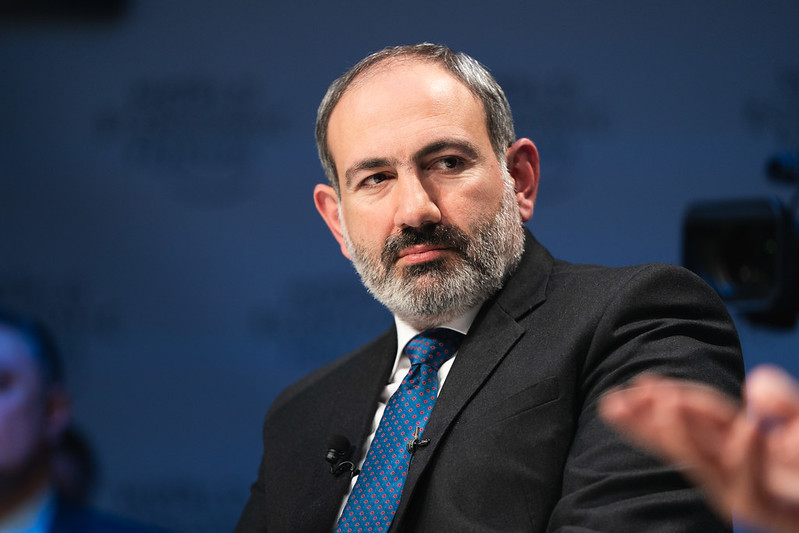Pašinyan's resistance to all opposition
Long under attack from opposition parties and movements and even the Apostolic Church for his policy of ‘normalising’ the conflict with Azerbaijan and emancipating himself from Russia's protection, the Armenian president categorically rules out the possibility of early elections. Kremlin keeps watch, knowing that Yerevan will not be able to do without Moscow's military and economic support.
Yerevan (AsiaNews) - The prime minister of Armenia, Nikol Pašinyan, has long been subjected to all kinds of invective and attacks at home, from opposition parties and movements and even from the Apostolic Church, but also from abroad with criticism from Baku and Moscow of his policy of ‘normalising’ the conflict with Azerbaijan and emancipating himself from Russia's protection. Several opposing MPs are calling for his impeachment after the surrender of some border villages to the Azeris, but from his Civil Accord party they reply that they take these threats ‘with humour’, and absolutely rule out the possibility of early elections.
The negotiations with the Azeris, for which Pašinyan is accused of ‘yielding to the enemy’, are paradoxically his best guarantee of defence against any attack, as observer Vadim Dubnov believes, while the street protests are slowly fading, despite the initiatives of the new leader of the Armenian protest movement ‘Tavowš in the name of the Fatherland’, Archbishop Bagrat Galstanyan, who is trying hard to unite all the oppositions to get rid of the prime minister. Even from Moscow come only rather benign warnings, beyond Pašinyan's ‘pro-European’ rhetoric, as the Kremlin knows that Armenia will not be able to do without Russia's military and economic support.
The Armenian Prime Minister's absence at the military parade in Red Square on 9 May, where all the leaders of the Csto Eurasian alliance were lined up alongside Putin, was downgraded to the need to remain in Yerevan while the street protests, animated by the archbishop of the border eparchy, were going on. Although in reality it was only a few days later, when the streets of the capital were still occupied by protesters, that Pašinyan paid a visit to Denmark, entrusting his collaborators with the control of the situation. Moreover, he was not even present at Putin's coronation on 7 May, where he merely sent his ambassador because ‘heads of state were not mandatorily signalled in the protocol of the ceremony’.
Pašinyan actually took part in the Eurasian Higher Economic Council, of which Armenia is president, but which was held in Moscow, where he met Putin personally, thus maintaining a formal rather than an effective detachment. There is also an ambiguous attitude on the Russian side: the street protests in Armenia are openly pro-Russian, supported not only by clerics, but also by people close to former president Robert Kočaryan, one of the Kremlin's closest Armenian friends. Yet they did not go beyond the outcry, with some echoes in the parliament in Yerevan.
Expressing the tension with the Russians more explicitly is Security Council Secretary Armen Grigoryan, playing the polemical role in the game of sides. For days now he has been calling on Moscow to withdraw all ‘peacekeeping’ troops from the border areas and especially from Zvartnots International Airport on the western outskirts of Yerevan, and explicitly speaks of the alliance with Russia as a ‘strategic mistake’. Foreign Minister Ararat Mirzoyan, on the other hand, limits himself to stating that ‘relations with Russia are not currently at their highest level’, also refraining from attending meetings of his Csto and CIS counterparts, leaving the prime minister free to take the positions most appropriate to the circumstances.
On the Russian side, invective against the Armenians is left to the exaggerated Foreign Ministry spokeswoman, Maria Zakharova, while Putin confines himself to tepid and terse comments, as if he did not really believe in removing Armenia from his sphere of influence. All these ambiguities ultimately play into the hands of Pašinyan, who keeps repeating that ‘historical Armenia and the current one are completely different things’, trying to build a new image of the country by going up through the contradictions of the Caucasus region and the turbulence of world geopolitics, waiting to see where they will lead.
Photo: Flickr / World Economic Forum







.png)










